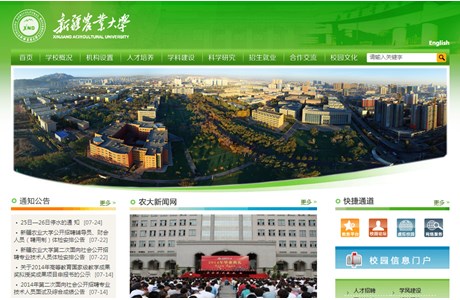Xinjiang Agricultural University

Xinjiang Agricultural University is a key institute of higher education under the administration of the government of Xinjiang Uygur Autonomous Region, China.
The internet's history is a story of innovation born out of necessity. In the 1960s, during the Cold War, the U.S. Department of Defense's Advanced Research Projects Agency (DARPA) funded a project to create a communication network that could withstand even partial destruction. Visionary computer scientist J.C.R. Licklider dreamt of a "Galactic Network" where information and programs would be accessible from anywhere. This vision led to the birth of ARPANET, the first wide-area network. It connected computers at universities and research institutions, allowing them to share resources and collaborate on projects. A crucial innovation for ARPANET's success was packet switching technology, which broke data into smaller packets and sent them over different routes.
The 1970s saw the invention of the Transmission Control Protocol/Internet Protocol (TCP/IP), a game-changer. TCP/IP established a common language for computers to communicate across diverse networks. 1983 marked a turning point: ARPANET and other networks adopted TCP/IP, officially giving birth to the internet as we know it today. The late 1980s witnessed another revolution – the World Wide Web (WWW) by Tim Berners-Lee. This introduced web browsers and hyperlinks, making information easily accessible through a user-friendly interface. The 1990s saw a surge in public internet access with the rise of internet service providers (ISPs) and web browsers like Mosaic and Netscape. Since the 1990s, the internet has undergone phenomenal growth. Search engines like Google, email platforms, e-commerce, social media, and mobile internet access have transformed how we communicate, work, and access information. The internet's future is constantly evolving with new technologies like cloud computing, artificial intelligence, and the Internet of Things (IoT) shaping its path forward.
University Profile
Get a quick snapshot of the university's key details.
| University Name | Xinjiang Agricultural University |
|---|---|
| Name in Local Language | 新疆农业大学 |
| Acronym | XAU |
| Year Established | 1952 |
Location
The university is located in Urumqi, Xinjiang Uygur Autonomous Region. Find the address of the university below.
| Address | 42 Nanchang Road, Urumqi, Xinjiang Uygur Autonomous Region, China |
|---|
Contact
Connect with the university easily! Find their contact details.
| Phone | +86 (991) 4523001 |
|---|---|
| Fax | +86 (991) 4520159 |
| Website |

|
| More Links |
Admission Info
Find information below on admission to Xinjiang Agricultural University.
| Student Body | Men and Women |
|---|
Scholarship and Financial Aids
There is no information found on scholarships or financial aids offered by Xinjiang Agricultural University. You may like to visit their website for more details.
Programs and Courses
Get a quick overview of programs and courses offered at this university.
| Bachelor's Degrees | Master's Degrees | Doctorate Degrees | Diplomas | |
|---|---|---|---|---|
| Arts & Humanities | n/a | n/a | n/a | n/a |
| Business & Social Sciences | n/a | n/a | n/a | n/a |
| Engineering | n/a | n/a | n/a | n/a |
| Language & Cultural Studies | n/a | n/a | n/a | n/a |
| Medicine & Health | n/a | n/a | n/a | n/a |
| Science & Technology | n/a | n/a | n/a |
Click on the following button to explore a detailed list of programs and courses of this institute.
View Course ListRelated Articles
Stay informed with the following article related to the university or higher education in China.
